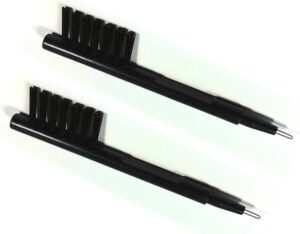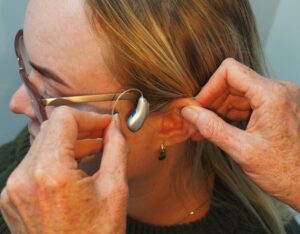Struggling with hearing? Request a hearing test appointment today.
We have some tips on how to take care of hearing aids, so you get optimal performance and long life.
Hearing aids are tiny devices are packed full of the latest technology to do their primary job: boosting the voices of people and the sounds of the environment around you, delivering it in crystal-clear fashion to your ears.
And just like any other technological device, hearing aids require maintenance so that they work properly, don’t break down and last for years.
We’re frequently asked questions about how to clean hearing aids and keep them in excellent working order. Here are a few simple steps you can take to prolong their life.
Firstly, What tools will I need?
Using these tools regularly will help maintain your hearing aids and ensure their longevity. Always follow the manufacturer’s instructions for specific cleaning guidelines. Remember that many of these items will be supplied in a hearing aid cleaning kit (either provided with the hearing aid or available to buy in the high street (or Amazon).
- A Soft Cloth: For wiping down the exterior of the hearing aids.
- A Hearing aid Cleaning Brush: To remove earwax and debris from openings.
- A Wax Pick or Wire Loop: To clean out any wax build-up in hard-to-reach areas.
- A Vent Cleaner: A tool specifically designed to clean the air vent in your hearing aids.
- A Drying Kit or Dehumidifier: To remove moisture from the hearing aids overnight.
- A Battery Door Opener: To safely open and clean around the battery compartment.
Cleaning Hearing Aids in 3 steps:
1. Get a Hearing Aid Cleaning Kit
Your hearing aids may have come with a cleaning kit, but if not, you can easily buy one in the High Street or order online — or ask the audiologist who supplied your hearing aids for one.
These handy maintenance kits typically contain tiny brushes that let you effectively clean your hearing aids along with dry cloths and special tools and magnets to remove the battery, if required. If you don’t have one, you may be able to improvise with some cotton buds and tissue paper.
2. Visually Inspect Your Hearing Aids
Instead of blindly wiping and wiping your hearing aids without much thought for what you’re doing — perhaps doing more harm than good — we recommend that before you clean your hearing aids, you do a visual inspection.
This will allow you to see any dirt or debris, including ear earwax, that may have accumulated around various parts, so you can then choose the right tool to get rid of it. Otherwise, you risk pushing debris further into the devices and potentially damaging them.
Start Cleaning Your Hearing Aids
- Use a soft cloth to clean your hearing aids gently
- Never use water, even if they’re water-resistance, or place them in water.
- Then use any special tools, like tiny brushes, to dislodge any earwax that may have built up along the devices.
Some hearing aids have filters or guards designed to protect against earwax, and they can be removed for cleaning. If yours have these, you’ll need to look at the manufacturer’s instructions on removing and replacing them once they’re clean.
How often should I clean hearing aids?
Hearing aids should be cleaned at regular intervals. See our cleaning guide below:
Daily Cleaning
- Wipe Down: Use a soft, dry cloth to remove any dirt, earwax, or moisture.
- Check Openings: Inspect and gently clean the microphone and receiver openings with a small brush or cleaning tool.
Weekly Cleaning
- Deep Clean: Use a cleaning brush to remove buildup from all openings. Replace wax guards if necessary.
- Inspect Components: Ensure all parts, such as tubing and domes, are clean and functioning correctly.
Monthly Cleaning
- Detailed Inspection: Conduct a thorough check for any issues that might require professional attention.
- Deep Cleaning: Clean all components more thoroughly, and consider using a hearing aid dehumidifier.
Professional Maintenance
- Regular Checkups: Schedule periodic visits with your audiologist for professional cleaning and maintenance to ensure optimal performance.
You can get your hearing aids professionally cleaned at Regain Hearing, as it’s part of our lifelong service to our customers. Contact us now to find out more.
Additional Hearing Aid Maintenance
Depending on your type of hearing aids, you may need to do some extra cleaning. It’s all the more vital to look after your hearing aids well given where they’re placed: in a moist channel that contains a waxy substance (earwax), not entirely conducive to the workings of electronic equipment. Earwax, for instance, can accumulate and clog parts of hearing aids, including the speaker, meaning you get muffled sounds and can’t hear properly all over again.
- Extra hearing aid cleaning is needed specifically for hearing aids that are worn behind the ear and have a tube running into the ear canal with a speaker at the end. You’ll need to disconnect the tubing and run a special cleaning wire that may be in your kit through it to make sure there’s nothing in there, like earwax or anything else.
- Other aspects about your hearing aids to keep in mind is that they’re not suited to high temperatures or wet environments. So if you’re holidaying in a sunspot, for instance, you’ll need to take extra care that your hearing aids are not out in the blazing sun all day — and that you don’t plunge into the pool with them.
Lots of care and regular cleaning will ensure your invaluable hearing aids continue to enhance your welfare and enjoyment of life.
Hearing Aid Cleaning Tips to Remember
These tips will help maintain the functionality and extend the lifespan of your hearing aids. Always follow the manufacturer’s guidelines for specific cleaning instructions.
- Avoid Moisture and Chemicals: Remove hearing aids before bathing and apply hair products like sprays or gels afterwards. Be cautious with sunscreen or creams to prevent damage.
- Daily Cleaning: Clean your hearing aids every evening to allow them to air out overnight. Use a soft cloth and avoid wipes containing chemicals or alcohol.
- Temperature and Moisture: Keep hearing aids indoors during extreme temperatures. Store them safely away from poolside or freezing conditions.
- Proper Storage: When not in use, place hearing aids in a case or charger to protect them from dirt and damage.
- Hygiene: Always wash your hands before cleaning your hearing aids to maintain their cleanliness and functionality.
Frequently asked Questions
How do I clean behind-the-ear (BTE) hearing aids?
- Remove the hearing aid from your ear.
- Separate the earmold from the hook, if possible, and clean it with warm, soapy water.
- Use a soft brush to clean the microphone ports and a wax pick to remove any debris.
- Dry the earmold completely before reattaching it to the hearing aid.
- Wipe the entire device with a dry, soft cloth.
How do I clean in-the-ear (ITE) hearing aids?
- Focus on the openings, such as the microphone ports, and use a soft-bristle brush to remove any wax or debris.
- Hold the device upside down while cleaning to prevent particles from falling inside.
- Use a wax pick to clear any remaining debris from the holes.
- Wipe the device with a clean, dry cloth.
Can I use water or alcohol to clean my hearing aids?
No, you should not use water, alcohol, or any cleaning solvents on your hearing aids as they can damage the sensitive electronics. Use only products specifically designed for hearing aids.
How should I store my hearing aids?
Store your hearing aids in a dry, safe place, such as a dehumidifier or the manufacturer’s case, to protect them from moisture and environmental debris. If you have non-rechargeable hearing aids, remove the batteries and leave the battery compartment open to dry overnight.
What should I do if my hearing aids get wet?
If your hearing aids get wet, wipe them off immediately with a dry cloth. Use a dehumidifier or drying container to remove moisture. Avoid using heat sources like hair dryers.
When should I seek professional cleaning or maintenance?
It’s recommended to have your hearing aids professionally cleaned every six months to ensure they are in good working condition. Additionally, if you notice any persistent issues despite regular cleaning, give Regain Hearing a call today.
You can get your hearing aids professionally cleaned at Regain Hearing, as it’s part of our lifelong service to our customers. Contact us now to find out more.


